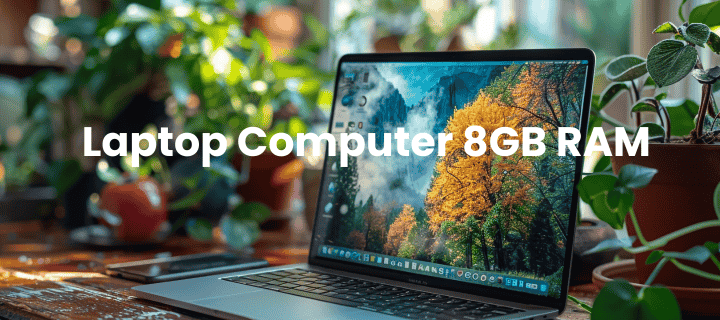
Laptop Computer 8GB RAM: The Sweet Spot for Performance and Affordability
What is RAM and Why Does It Matter?
Before we dive into the specifics of 8GB RAM laptops, it’s crucial to understand what RAM is and its role in computer performance.
Definition of RAM
RAM, or Random Access Memory, is a type of computer memory that temporarily stores data for quick access by the processor. Unlike storage devices like hard drives or SSDs, RAM is volatile memory, meaning it loses its contents when the power is turned off.
The Role of RAM in Computer Performance
RAM plays a critical role in a computer’s performance:
- Speed: The processor can access data and instructions more quickly thanks to RAM, which greatly accelerates activities.
- Multitasking: Since more RAM keeps several programs and processes open at all times, multitasking runs more smoothly.
- Application Performance: RAM has considerable impact on the speed at which apps load and operate, particularly on resource-intensive tasks.
- System Responsiveness: Keeping the system responsive generally means that lag and slowdowns are minimized with enough RAM.
The Standardization of 8GB RAM Uptake
For many users, 8GB of RAM has been the sweet spot within the last ten years. Let’s examine why this quantity has grown to be so common.
Historical Context
- Early 2000s: 1GB RAM was common
- Late 2000s: 4GB became standard
- 2010s: 8GB emerged as the new norm
Factors Contributing to 8GB Popularity
- systems like Windows 10 and macOS run comfortably with 8GB RAM.
- Application Demands: Everyday applications have grown more resource-intensive, benefiting from increased RAM.
- Cost-Effectiveness: 8GB offers a good balance between performance and price for manufacturers and consumers.
- Future-Proofing: While not excessive, 8GB provides some headroom for future software demands.
- Operating System Requirements: Modern operating Understanding RAM Specifications
When considering an 8GB RAM laptop, it’s important to understand the various specifications that can impact performance.
RAM Types
- DDR3: Older, slower, but still found in some budget laptops
- DDR4: Current standard, offering improved speed and energy efficiency
- DDR5: Emerging technology, not yet common in mainstream laptops
RAM Speed
RAM speed is measured in MHz (megahertz). Higher speeds can improve performance, especially for integrated graphics.
- speeds for DDR4: 2133 MHz, 2400 MHz, 2666 MHz, Common 3200 MHz
Single Channel vs. Dual Channel
- Single Channel: One stick of 8GB RAM
- Dual Channel: Two 4GB sticks, potentially offering better performance
Pros of 8GB RAM Laptops
Let’s examine the advantages of choosing a laptop with 8GB of RAM.
Adequate for Most Users
8GB RAM is sufficient for a wide range of tasks, including:
- Web browsing with multiple tabs
- Office productivity (Word, Excel, PowerPoint)
- Streaming media
- Light photo editing
Cost-Effective
Laptops with 8GB RAM often hit the sweet spot in terms of price-to-performance ratio.
Energy Efficiency
Compared to higher RAM configurations, 8GB laptops typically consume less power, potentially extending battery life.
Compatibility
Most software and applications are designed to run well on systems with 8GB RAM.
Cons of 8GB RAM Laptops
While 8GB RAM is suitable for many users, it does have some limitations.
Potential for Future Obsolescence
As software requirements increase, 8GB may become insufficient in the coming years.
Limitations for Power Users
8GB can be restrictive for:
- Heavy multitasking
- Video editing
- 3D rendering
- Running virtual machines
Possible System Slowdowns
Under heavy loads or with multiple resource-intensive applications, 8GB systems may experience slowdowns or lag.
Ideal Use Cases for 8GB RAM Laptops
Understanding who benefits most from 8GB RAM laptops can help you determine if it’s the right choice for you.
Students
Most students find 8GB RAM sufficient for:
- Research and writing papers
- Creating presentations
- Online learning platforms
- Light coding tasks
Office Professionals
8GB RAM laptops are well-suited for many office tasks:
- Email management
- Document creation and editing
- Web-based applications
- Video conferencing
Casual Users
For everyday computing needs, 8GB RAM is more than adequate:
- Web browsing
- Social media
- Streaming services (Netflix, YouTube)
- Basic photo management
Light Content Creators
Some content creation is possible with 8GB RAM:
- Basic photo editing
- Simple video editing
- Podcast recording and editing
When 8GB RAM May Not Be Enough
It’s important to recognize scenarios where 8GB RAM might be insufficient.
Heavy Multitasking
Users who frequently run multiple resource-intensive applications simultaneously may find 8GB limiting.
Professional Content Creation
Tasks like 4K video editing, complex 3D modeling, or working with large Photoshop files often require more than 8GB RAM.
Gaming
While some games run fine on 8GB RAM, many modern titles benefit from 16GB or more, especially for smoother performance at higher settings.
Software Development
Developers running multiple development environments, emulators, or virtual machines may need more than 8GB RAM.
Comparing 8GB RAM to Other Configurations
To better understand the place of 8GB RAM in the market, let’s compare it to other common configurations.
Upgrading RAM: Possibilities and Limitations
For those considering a laptop with upgradeable RAM, here are some factors to consider.
Advantages of Upgradeable RAM
- Future-Proofing: Allows for increased performance as needs change
- Cost-Effective: Start with 8GB and upgrade later if necessary
- Flexibility: Adapt the laptop to different use cases over time
Limitations and Considerations
- Hardware Compatibility: Not all laptops support RAM upgrades
- Warranty Implications: Upgrading RAM may void warranties in some cases
- Skill Required: Some users may not feel comfortable performing upgrades themselves
Impact of 8GB RAM on Different Operating Systems
The performance of 8GB RAM can vary depending on the operating system. Let’s examine how it fares with popular OS options.
Windows 10/11
- Generally runs well with 8GB RAM
- Performance may vary based on installed applications and background processes
macOS
- Known for efficient memory management
- 8GB RAM provides a smooth experience for most users
Linux
- Many distributions run efficiently with 8GB RAM
- Performance can vary greatly depending on the specific distribution and desktop environment
Optimizing Performance with 8GB RAM
To get the most out of a laptop with 8GB RAM, consider these optimization tips:
Managing Background Processes
- Use Task Manager (Windows) or Activity Monitor (macOS) to identify and close unnecessary background applications
Utilizing Virtual Memory
- Ensure your system is configured to use virtual memory effectively
Regular Maintenance
- Perform disk cleanups and defragmentation (for HDDs) to maintain system efficiency
Software Choices
- Opt for lightweight alternatives to resource-intensive applications when possible
The Future of RAM in Laptops
As we look ahead, it’s worth considering the future trends in laptop RAM.
Increasing Baseline RAM
- 16GB may become the new standard in the coming years
Advancements in RAM Technology
- DDR5 adoption will bring increased speeds and efficiency
Impact of Cloud Computing
- Cloud services may reduce the need for high local RAM in some use cases
FAQs About Laptop Computers with 8GB RAM
Let’s address some common questions about 8GB RAM laptops.
Can Windows 11 run with 8GB of RAM?
Sure, Windows 11’s minimal requirements for RAM are satisfied by 8GB of RAM. To make things go more smoothly, though—especially while multitasking—16GB is suggested.
Can I run Photoshop with 8GB RAM?
Yes, you can run Photoshop with 8GB RAM, but performance may be limited when working with large files or multiple layers.
How does 8GB RAM affect gaming performance?
8GB RAM is sufficient for many games, but modern AAA titles may experience performance issues. 16GB is increasingly becoming the recommended amount for gaming.
Can I get 16GB RAM for my laptop instead of 8GB?
The type of laptop you own determines this. While RAM upgrades are accessible in many laptops, some computers contain RAM that is soldered directly to the motherboard.
For what length of time would 8GB RAM be adequate for daily use?
For the foreseeable future, 8GB RAM should be sufficient for routine operations like using office software, streaming movies, and online browsing. For more difficult activities, you might need to upgrade sooner rather than later, though, as software needs rise.
Does more RAM always mean better performance?
Not necessarily. While more RAM can improve multitasking and handle resource-intensive applications better, other factors like CPU, GPU, and storage type also significantly impact overall performance.
Conclusion
As they combine price and performance, laptop computers with 8GB RAM are still a popular option for many customers. Eight gigabytes of RAM is more than enough for everyday operations like online browsing, document editing, light content creation, and light gaming for office professionals, students, and casual users. It’s crucial to understand its limitations, though, especially for power users doing resource-intensive tasks like operating several virtual computers or editing videos.It’s possible that, as technology develops, 8GB will become the minimal amount needed for efficient processing. Still, it’s still a good choice for a lot of people in the near future. Take your budget, future upgrade possibilities, and unique needs into account while selecting a laptop.
Laptop Computer 8GB RAM
- • Pros: Lower cost, sufficient for very basic tasks
- Better multitasking, future-proofing, suitable for more demanding tasks
- Ideal for professional workstations, heavy multitasking, and demanding applications
- Significantly limiting for most modern applications
- Higher cost, potentially unnecessary for casual users
- • Cons: Considerably more expensive, overkill for most users
